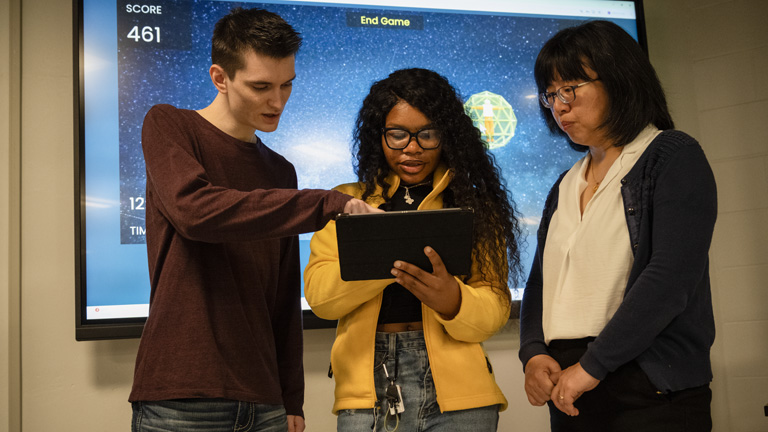May 05, 2025
Undergrads and grad students find opportunities and rewards in a rapidly growing, interdisciplinary field.

Mizzou Engineers are driven by curiosity, continually expanding their opinions, collaborating across disciplines and exploring paths that redefine traditional thought.
Game development is one such path. No longer the sole domain of the entertainment industry, game technology now helps create low-risk environments in which pilots can learn to fly, first-responders can address crises, and surgeons can carry out complex procedures.
“Games have been found to help in a variety of fields — education, health care, mental health and more — and are effective in enhancing cognitive skills, decision-making and knowledge retention,” Fang Wang, director of undergraduate studies for the Department of Engineering and Information Technology, said. “In science, game-like interfaces help researchers fold proteins, classify astronomical data, decode DNA sequences and much more.”
Wang teaches CMP_SC/INFOTC 4630: Game Development, in which students build proficiency in programming, scripting, game engines and user interface/experience design.
“The primary focus is on game development, but the skills students acquire prepare them for careers in software engineering, interactive media and other technology-driven fields,” Wang said.
Mizzou undergraduate Anyshya Hemphill discovered game development in high school through PREP-KC’s Pathways to Technology program.
“It was super cool seeing the different components go from simple objects and frameworks to full characters, stories and levels,” Hemphill said.
Hemphill met Wang through the KC Scholars Undergraduate Research program and became interested in her work on cognitive training games for autistic adults. She joined Wang’s research, reviewing code and testing games. The process showed her how computer science and psychology can work together, she said.
“There are no limitations to what game development can be used for,” Hemphill said. “It can help us gain insight into crucial feedback for our health or it can be an engaging platform for people to interact and have fun.”
A sophomore, Hemphill is exploring graduate programs in industrial-organizational psychology.
“I hope to invest my skills in younger students who will eventually pursue careers and academic journeys that utilize their talents,” she said.
Putting knowledge to work
Senior Danny Saab has wanted to develop games since he was in elementary school. He conducted undergraduate research with Scottie Murrell before enrolling in Game Development at Mizzou. There, Wang tapped him to work on her cognitive training games research project.
“Dr. Wang taught me that everything was learnable,” Saab said. “You can always figure out what you need to do, especially when you have a team of experienced people who can help.”
Gavin Boley is pursuing a master’s degree in computer science. He says he has been modding and breaking games from an early age. He took Wang’s Game Development his junior year to improve his skills with the Unity game engine. And he has worked on Wang’s cognitive training games project as part of his master’s research.
Boley plans to work in the game industry after graduation but emphasizes that game development helps students become more well-rounded engineers.
“Game development challenges you to bring together logic, creativity and collaboration, skills that are core to engineering,” Boley said. “It’s a unique way to apply technical skills to something immediately visual and rewarding. Plus, it opens the doors to coding, simulation, virtual reality, augmented reality, graphic design and much more.”
Blaze your own trail. Choose Mizzou Engineering!